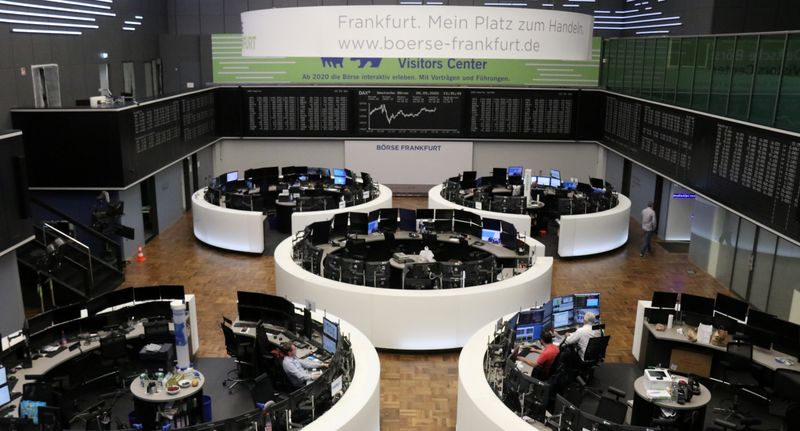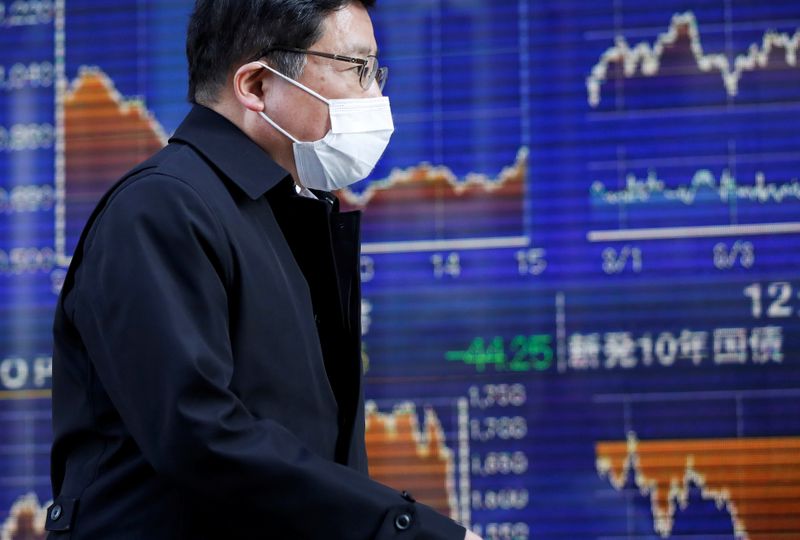By Tom Arnold and Tom Westbrook
LONDON/SINGAPORE (Reuters) - European stocks slipped lower on Wednesday and gold gained as a sceptical press report undermined some hopes for a COVID-19 vaccine and concern about obstacles to a recovery from the pandemic returned.
Italian bonds sustained their multi-week lows, continuing to gain from a Franco-German plan for a 500 billion-euro coronavirus recovery fund, ignoring a hawkish counter-proposal in the works.
Europe's STOXX 600 index was 1.6% lower. The blue-chip FTSE 100 was down 0.4% as Rolls-Royce Holdings Plc (LON:RR) shed 0.8% after it said it would cut 9,000 jobs and might close some of its factories.
MSCI's broadest index of Asia-Pacific shares outside Japan edged up 0.1%. Its world stock index was 0.1% lower after reaching its highest level since March 9 on Tuesday.
Wall Street ended Tuesday lower after medical news website STAT cast doubt on a Moderna Inc COVID-19 vaccine trial. The report said the trial results, which had rallied global stocks this week, lacked detail.
"With markets being very narrative driven, this was sufficient to see European equities pick up where Wall Street left off and head lower," said James Athey, investment director, Aberdeen Standard Investments."
Two-thirds of 223 fund managers surveyed by Bank of America (NYSE:BAC) reckon recent gains are a bear-market rally.
S&P 500 futures were last up 0.4%. Oil was steady and gold rose to $1,750.93 per ounce.
Italy's 10-year bond yield was holding near five-and-a-half-week lows hit following the recovery fund announcement. The gap with Germany's 10-year yield was at 211 basis points, less than 10 bps higher than Tuesday's five-week lows.
The euro edged up 0.18% to $1.0945, near a two-week peak of $1.09755 reached on Tuesday, supported by the Franco-German proposal for the common fund.
Elsewhere, New Zealand central bank chief Adrian Orr backtracked a little from the possibility of negative rates, a prospect he had flagged just days before. That helped support the kiwi dollar.
Doubts about the outlook held back commodity prices. Japanese business confidence slumped to a decade low as the economy entered recession. Australian retail sales suffered their steepest-ever decline in April.
And the U.S. economy won't recover its lost ground until sometime after next year, the non-partisan Congressional Budget Office said on Tuesday.
Brent crude futures were at $34.64 per barrel, having rallied nearly 7% this week. U.S. crude was 0.4% lower at $31.84 a barrel.
"While countries have started to relax restrictions on economic and social activities, economies will not return to where things were before the outbreak," said strategists at Singapore's DBS bank in a note.

"Geopolitical tensions, especially between the U.S. and China, have also returned and are likely to intensify into the U.S. elections in November."
